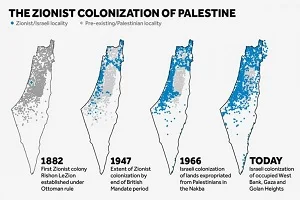The Israeli Occupation: A Long-standing Struggle in Palestine
The conflict between Israel and Palestine has been a contentious issue for decades, with one of the central points of contention being the Israeli occupation of Palestinian territories. The occupation, which began in 1967 following the Six-Day War, has had far-reaching consequences for both Israelis and Palestinians, shaping the political, social, and economic landscape of the region.
The Israeli occupation of Palestinian territories primarily involves the West Bank, including East Jerusalem, and the Gaza Strip. Despite international condemnation and numerous United Nations resolutions calling for the withdrawal of Israeli forces from these areas, the occupation persists, perpetuating a cycle of violence and unrest.
One of the most significant aspects of the Israeli occupation is the establishment of Israeli settlements in the occupied territories. These settlements, considered illegal under international law, are communities of Israelis built on land confiscated from Palestinians. The expansion of settlements has resulted in the displacement of Palestinian families, the confiscation of their land, and the fragmentation of Palestinian territory, making the prospect of a viable Palestinian state increasingly remote.
The Israeli government argues that the settlements are necessary for security and strategic purposes, citing historical and biblical connections to the land. However, critics argue that the continued expansion of settlements undermines the prospects for a two-state solution, which is widely seen as the most viable path to peace in the region.
In addition to the physical presence of Israeli settlements, the occupation is characterized by a system of checkpoints, barriers, and military checkpoints that restrict the movement of Palestinians in their own land. Palestinians face daily challenges accessing essential services such as healthcare, education, and employment, leading to widespread frustration and resentment.
Furthermore, the Israeli occupation has resulted in human rights abuses and violations of international law. Palestinians are subject to arbitrary arrests, detention without trial, and other forms of collective punishment. Reports from human rights organizations detail instances of torture, mistreatment, and excessive use of force by Israeli security forces against Palestinian civilians, including children.
The ongoing conflict and occupation have had a profound impact on the lives of both Israelis and Palestinians, perpetuating a cycle of violence, distrust, and suffering. Despite numerous attempts to negotiate a resolution to the conflict, including peace talks brokered by the international community, a lasting solution remains elusive.
In conclusion, the Israeli occupation of Palestinian territories is a complex and deeply entrenched issue that lies at the heart of the Israeli-Palestinian conflict. Addressing the root causes of the occupation, including the expansion of settlements, restrictions on Palestinian movement, and human rights abuses, is essential for achieving a just and lasting peace in the region.
Certainly! Here are some historical facts about the nation of Israel:
Ancient Origins
The history of Israel traces back thousands of years, with its origins rooted in the ancient Hebrew tribes of the Levant region.
Exodus and Covenant
The biblical account of the Exodus from Egypt under the leadership of Moses and the establishment of the covenant between God and the Israelites is a foundational narrative in Israel's history.
Kingdom of Israel
Israel experienced periods of unity and division, including the establishment of the United Monarchy under Kings Saul, David, and Solomon, followed by the division into the northern Kingdom of Israel and the southern Kingdom of Judah.
Exile and Diaspora
The Assyrian and Babylonian conquests led to the exile of many Israelites from their homeland, marking the beginning of the Jewish Diaspora, which scattered Jewish communities across the ancient world.
Return from Exil
Following the Babylonian exile, some Israelites returned to their land and began the process of rebuilding Jerusalem and the Temple under Persian rule.
Hellenistic and Roman Periods
Israel came under the influence of Hellenistic culture after the conquests of Alexander the Great, followed by Roman rule, during which significant events such as the Maccabean Revolt and the life of Jesus of Nazareth took place.
Diaspora Communities
Throughout history, Jewish communities have thrived in various regions, contributing to the cultural, scientific, and economic development of their host societies.
Modern State of Israel
The modern State of Israel was established in 1948, following the United Nations partition plan for British Mandate Palestine. This event marked a significant moment in Jewish history, providing a homeland for Jews around the world.
Arab-Israeli Conflict
The establishment of Israel led to ongoing conflict with neighboring Arab states, marked by wars and peace processes, including the Arab-Israeli War of 1948, the Six-Day War of 1967, and the Oslo Accords of the 1990s.
Cultural and Technological Innovation
Despite its relatively small size, Israel has become known for its vibrant cultural scene and significant contributions to technology, innovation, and entrepreneurship on the global stage.
These facts provide a glimpse into the rich and complex history of the nation of Israel.
That is the article entitled History of the Israeli Colonization in the Palestinian Territory. If there are any deficiencies or errors in writing this article, Berbagai Reviews express their deepest apologies. Please leave a wise message in the comments column provided. Thank you for visiting, hopefully it's useful.
Other reading materials, can help with school assignments, click Pustaka Pengetahuan
To increase insight and knowledge, please click Baraja Farm
For tutorial on how to cultivate, please click Baraja Farm Channel
Social media please click facebook




Tidak ada komentar:
Posting Komentar